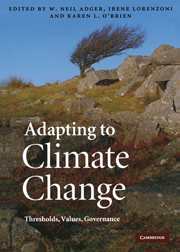Book contents
- Frontmatter
- Contents
- List of contributors
- Preface
- 1 Adaptation now
- Part I Adapting to thresholds in physical and ecological systems
- Part II The role of values and culture in adaptation
- 9 The past, the present and some possible futures of adaptation
- 10 Do values subjectively define the limits to climate change adaptation?
- 11 Conceptual and practical barriers to adaptation: vulnerability and responses to heat waves in the UK
- 12 Values and cost–benefit analysis: economic efficiency criteria in adaptation
- 13 Hidden costs and disparate uncertainties: trade-offs in approaches to climate policy
- 14 Community-based adaptation and culture in theory and practice
- 15 Exploring the invisibility of local knowledge in decision-making: the Boscastle Harbour flood disaster
- 16 Adaptation and conflict within fisheries: insights for living with climate change
- 17 Exploring cultural dimensions of adaptation to climate change
- 18 Adapting to an uncertain climate on the Great Plains: testing hypotheses on historical populations
- 19 Climate change and adaptive human migration: lessons from rural North America
- Part III Governance, knowledge and technologies for adaptation
- 31 Conclusions: Transforming the world
- Index
- References
15 - Exploring the invisibility of local knowledge in decision-making: the Boscastle Harbour flood disaster
Published online by Cambridge University Press: 31 August 2009
- Frontmatter
- Contents
- List of contributors
- Preface
- 1 Adaptation now
- Part I Adapting to thresholds in physical and ecological systems
- Part II The role of values and culture in adaptation
- 9 The past, the present and some possible futures of adaptation
- 10 Do values subjectively define the limits to climate change adaptation?
- 11 Conceptual and practical barriers to adaptation: vulnerability and responses to heat waves in the UK
- 12 Values and cost–benefit analysis: economic efficiency criteria in adaptation
- 13 Hidden costs and disparate uncertainties: trade-offs in approaches to climate policy
- 14 Community-based adaptation and culture in theory and practice
- 15 Exploring the invisibility of local knowledge in decision-making: the Boscastle Harbour flood disaster
- 16 Adaptation and conflict within fisheries: insights for living with climate change
- 17 Exploring cultural dimensions of adaptation to climate change
- 18 Adapting to an uncertain climate on the Great Plains: testing hypotheses on historical populations
- 19 Climate change and adaptive human migration: lessons from rural North America
- Part III Governance, knowledge and technologies for adaptation
- 31 Conclusions: Transforming the world
- Index
- References
Summary
Introduction
On 16 August 2004, the Boscastle Harbour flood occurred in north Cornwall, England. One hundred tons of water per second funnelled through Boscastle that day, destroying shops, uprooting trees, and sweeping cars and caravans out to sea. I use the case of Boscastle as an illustration of the subordination of local knowledge regarding adaptation to climate, and the implications these actions might have for climate change policy. Flooding is a regular event in the region, and indigenous Cornish have a long history of adapting to it. Their knowledge about local hydrology contrasts sharply with that of recent non-Cornish incomers to the area and of government officials, who viewed the flood as an unusual event possibly caused by global warming.
In this chapter, I illustrate how various policy decisions implemented since Boscastle ceased to be a manor in 1946, and particularly due to the influence of tourism, have reversed the effectiveness of local adaptive behaviours. Although the focus of this chapter is on Boscastle (as shown in Figure 15.1), the observations shed light on related fields of enquiry, most significantly the importance of using historical knowledge to inform decisions about development and management of local environments, as well as the problem of public participation in formulating adaptive responses to climate change. This research is based on 20 months of ethnographic fieldwork carried out from September 2003 to May 2005 in north Cornwall, with two bouts of follow-up research in December 2005 and January 2007.
- Type
- Chapter
- Information
- Adapting to Climate ChangeThresholds, Values, Governance, pp. 240 - 254Publisher: Cambridge University PressPrint publication year: 2009
References
- 3
- Cited by

